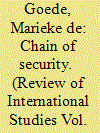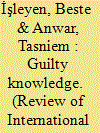|
|
|
Sort Order |
|
|
|
Items / Page
|
|
|
|
|
|
|
| Srl | Item |
| 1 |
ID:
157724


|
|
|
|
|
| Summary/Abstract |
Increasingly, private companies – including Twitter, airlines, and banks – find themselves in the frontline of fighting terrorism and other security threats, because they are obliged to mine and expel suspicious transactions. This analytical work of companies forms part of a chain, whereby transactions data are analysed, collected, reported, shared, and eventually deployed as a basis for intervention by police and prosecution. This article develops the notion of the Chain of Security in order to conceptualise the ways in which security judgements are made across public/private domains and on the basis of commercial transactions. Drawing on the work of Bruno Latour, this article understands the security chain as the set of practices whereby commercial transactions are collected, stored, transferred, and analysed, in order to arrive at security facts. Understanding the trajectory of the suspicious transaction as a series of translations across professional domains draws attention to the processes of sequencing, movement, and referral in the production of security judgements. The article uses the chain of financial suspicious transactions reporting as example to show how this research ‘thinking tool’ can work. In doing so, it aims to contribute to debates at the intersection between International Relations (IR) and Science-and-Technology Studies (STS).
|
|
|
|
|
|
|
|
|
|
|
|
|
|
|
|
| 2 |
ID:
193303


|
|
|
|
|
| Summary/Abstract |
This article studies practices of knowledge production during counterterrorism financing court cases in European courts. Developments in international law have contributed to novel regulations to criminalise and prosecute the funding of terrorism in advance of terrorist violence. In this study, we study how court cases have become important spaces for contesting and evaluating multiple knowledge claims on terrorist threat and suspicion by analysing case proceedings from both the Netherlands and the United Kingdom. Building on recent debates in International Relations and postcolonial theory, we make two contributions. First, building on insights from postcolonial literature on ‘abyssal thinking’, we illustrate how legal practices differentiate between different ways of knowing by dismissing certain experiences as ‘emotional’ or ‘subjective’ in contrast to the assumed objectivity of other knowledge claims. We argue that decisions on what counts as knowledge in a court setting are situated in a specific sociopolitical setting, whereby particular knowledge and life-worlds are recognised at the expense of others. Second, we empirically show how the novel criminal laws shifts the responsibility to know terrorist threat from the state to ordinary citizens. We illustrate how the court reinforces new security logics where the state can entertain doubt, uncertainty, and trust in their practices, while the citizens cannot.
|
|
|
|
|
|
|
|
|
|
|
|
|
|
|
|
| 3 |
ID:
148685


|
|
|
|
|
| Summary/Abstract |
The migration-security nexus, already at the heart of EU policymaking before the 2011 Arab uprisings, became acute after the forced displacements from Syria and the deterrence measures introduced. The internalisation by broader publics of “security knowledge” regarding migration contributed to the securitisation move. However, the construction of migration into a security-laden notion goes beyond both the adoption of deterrence measures and the straightforward association of migration with state as well as societal (in)security. Through the lens of its cooperative tools with its southern neighbours, the EU has built complex interdependencies between migration, post-2011 regional stabilisation and security. In order to read the EU’s securitised migration politics properly, the migration-security nexus must be embedded in its social, geopolitical and temporal fields. Perceptions of geopolitical threats, concurrent strains and divergences over European integration and immigration constitute an enabling terrain for the politics of securitisation.
|
|
|
|
|
|
|
|
|
|
|
|
|
|
|
|
|
|
|
|
|